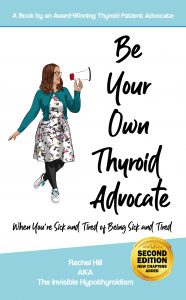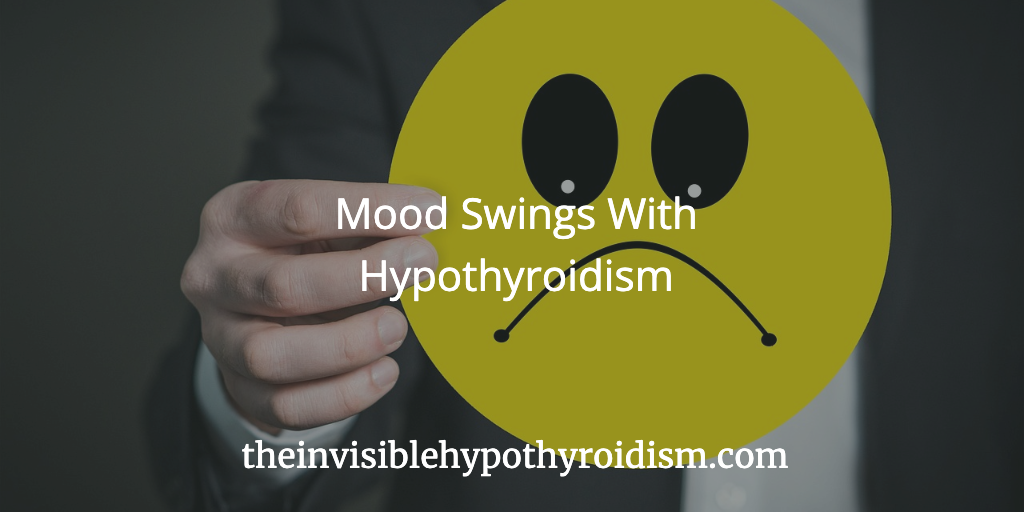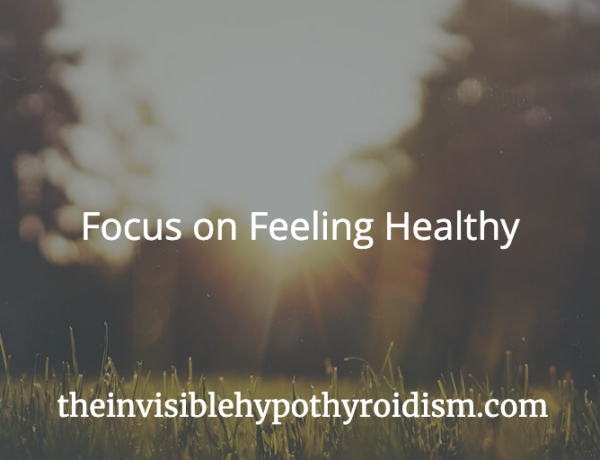We already know that thyroid conditions Hypothyroidism and Hashimoto’s often come hand in hand with mental health conditions such as anxiety and depression, but rarely do we talk about briefer swings in mood.
The book “You, Me and Hypothyroidism: When Someone You Love Has Hypothyroidism” discusses thyroid mood swings and gives the perspective of a husband trying to understand them:
“Coping With Mood Swings:
When I saw changes in Rachel’s mood, including mood swings, I had to remind myself that it wasn’t her. It was her thyroid condition. That it wasn’t her choice to feel all these various emotions, sometimes close together. It was something she was working through and trying to understand herself.
Instead of getting frustrated or put out by it, or questioning it too much, I learned to just enjoy the good swings, whilst being aware that a
low mood swing may be just around the corner. And after a while, I was even able to identify the warning signs of a low mood swing coming, meaning I could adapt to stop the snowball from getting any bigger.A lot of coping with your loved one having [a mood swing] and coming out of it stronger comes from good communication and paying attention to the build-up. Watching closely for the cues that certain things might be making things worse, and taking mental notes of what works. It has involved trial and error and I still get it wrong every now and then, but I know that generally, she prefers to be left alone if she’s experiencing mood swings and encouraging her to go for a walk or get outside helps her to feel like she’s worked through the swing. Try to pinpoint with your loved one, what does and doesn’t help in these moments. Also communicate how you feel when a mood swing strikes.”
Hormones and Mood
Experiencing a shorter tempter, feeling overemotional, anxious and clingy or even wanting to be left alone are not uncommon with hormonal health conditions. We already know the mood swings caused by hormonal changes in menstruating women and those experiencing the menopause or perimenopause, are not uncommon. Hypothyroidism can lead to fluctuating levels of hormones too.
Hypothyroidism can also affect our physical appearance, in the form of weight changes, skin changes, hair loss and more, which can also lead to low self-esteem and mental health difficulties.
Why Hypothyroidism Can Cause Mood Swings
The thyroid plays a crucial part in brain chemistry and function, so we shouldn’t be surprised that a thyroid condition, such as hypothyroidism, can cause unpredictable mood swings.
An optimally treated thyroid condition should ideally leave us with little to no ongoing symptoms or complaints, such as mood swings and mental health difficulties. Therefore, if you’re still experiencing these whilst on thyroid medication, you may wish to confirm that you are indeed being optimally treated. Many of us don’t realise that our Free T3 levels, which are important for optimal functioning of the brain, including: cognitive function, the ability to concentrate, mood, memory, attention span, emotions, the ability to cope with life’s stresses etc. are actually low.
Unfortunately, a lot of us aren’t even having our Free T3 levels tested, to check if our thyroid medication is optimising thyroid hormone levels. Free T3 forms part of the full thyroid panel, with the the other test in this panel being: TSH, Free T4, Thyroid Peroxidase Antibodies and Thyroglobulin Antibodies where possible.
Most the time, it seems we’re only having TSH checked, which of course, didn’t give the full picture.
It’s worth knowing that you can order full thyroid panels yourself from online laboratories. Find a UK lab here and a US lab here.
Only testing TSH does not confirm whether thyroid medications, and especially T4-only medications such as Levothyroxine, have adequately raised T3 and T4 levels. Especially as so many of us on T4-only medications struggle to convert the T4 in them to enough T3.
Many studies also conclude a link between low Free T3 levels and mood. In fact, suicidal patients have been found to have a higher incidence of thyroid disorders, with lower Free T3 levels than non-suicidal people. [1]
How Hashimoto’s Can Cause Mood Swings
Hashimoto’s, the autoimmune disease which 90% of us with hypothyroidism have as the cause, can also cause swings of TSH as ongoing thyroid function is lost, with hyper and hypo symptoms to match. [2]
Hyperthyroid symptoms can include hyperactivity, anxiety, irritability and disturbed sleep, whilst hypothyroidism often causes fatigue and depression. Do those swinging moods remind you of anything? Bipolar disorder perhaps?
It could well be suggested that some bipolar diagnoses are actually masking undiagnosed Hashimoto’s, where patients swing between hypo and hyper symptoms, as the thyroid is attacked and destroyed, and thyroid hormone is released into the bloodstream in waves. This can present as mood swings.
The 2002 study: “High Rate of Autoimmune Thyroiditis in Bipolar Disorder: Lack of Association with Lithium Exposure”, found that Hashimoto’s antibodies were more prevalent in a sample of outpatients with bipolar disorder (28%), in comparison to a control group (3-18%). [3]
Getting Hashimoto’s controlled i.e. in remission can help.
If you don’t know whether you fall in to the 90% with Hashimoto’s as the cause for your hypothyroidism, you can ask your doctor test, or order the test yourself from places such as LetsGetChecked (a US testing company) and Medichecks (for those in the UK).
If You Still Need Medication for Your Mental Health, Then That’s OK Too
Of course, antidepressants, anti-anxiety meds etc. can be a great help to many people and taking them is not ‘wrong’. I am not anti-medication, but I am pro-informed decision, which means making sure those that who are thyroid patients also experiencing mental health conditions, know that addressing their endocrine health fully may well resolve their mental health complaints and mood swings which often affect relationships and wider parts of life.
Other Things To Consider
Being low in vitamins such as iron, B12 and Vitamin D can also affect our mood and mental health.
Do you experience mood swings with hypothyroidism?

The book Be Your Own Thyroid Advocate: When You’re Sick and Tired of Being Sick and Tired, which covers how Rachel went from struggling with depression and anxiety with an under-treated thyroid condition, to finally thriving in life again and coming out the other side.
References:
[1] http://www.scielo.br/scielo.php?script=sci_arttext& pid=S0101-60832018000100012
[2] https://www.ncbi.nlm.nih.gov/pubmed/3066320
[3] https://www.ncbi.nlm.nih.gov/pubmed/11958781
[4] https://www.sciencedaily.com/releases/2007/06/070604170803.htm





